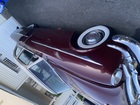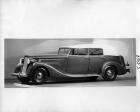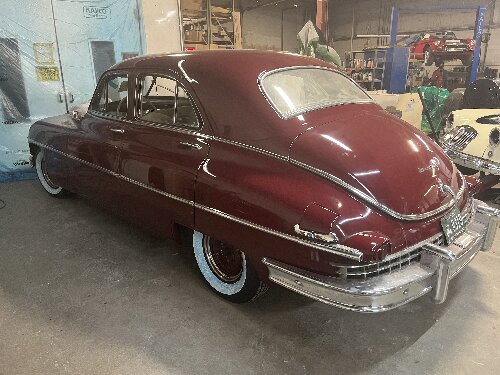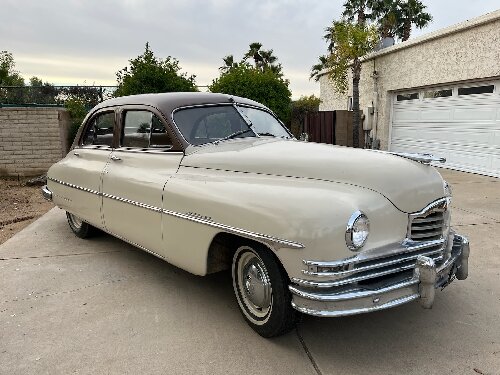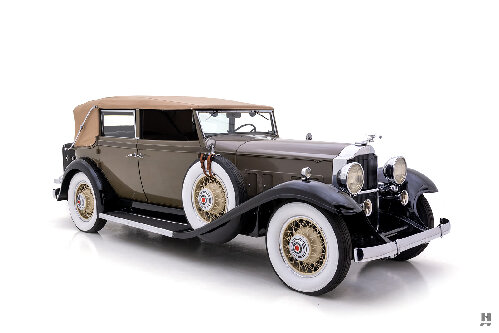|
Re: Bad Gas in Tank
|
||||
|---|---|---|---|---|
|
Forum Ambassador
|
Congratulations on acquiring what sounds like a nice car.
Not sure which part you are referring to as the regulator since stock cars never had anything like that. If it has an electric pump needing a regulator then that is another subject. Some thoughts on the gas. Old gas seems to have a recurring theme of someone starting an engine with old gas, running it and shutting down. The next day they go to start the car and find the valves have stuck. On several occasions that issue of stuck valves has resulted in an engine tear down to free them. Just be aware if the gas is old enough to stink it definitely needs replacing. The old gas may not in itself be the culprit but sure seems to go hand in hand with stuck valve issues. If the old gas is ethanol free the fuel pump may not have the ethanol resistant rubber and if it has the old rubber, that rubber will self destruct fairly quickly when ethanol hits it. I would go ahead and rebuild the mechanical pump sooner rather than later using kits containing new rubber from one of the Packard vendors or from Then and Now.http://then-now-auto.com/shop-2/ Once the mechanical pump is rebuilt then you can do what is needed to place the electric on priming duty or emergency use only. Second point is be careful when draining the old gas from the tank. If original, the drain plug is steel and so is the fitting in tank it threads into. If it has never been --or at least a been long time since removed plug may be rusted in place. Hold the piece with the hole with large vice grips or something similar as you try to loosen the plug. If the plug is seized and rotates the entire assy that is a major repair. The assy is essentially pressed in the metal and once loosened, the tank will leak. The tank has to be removed and repaired to stop the leak and that repair is not an easy task. There are no new tanks so if it is damaged or rusty it comes down to trying to find a good used and those are getting very tight. If you do remove the old plug, suggest you replace it with a brass plug.
Posted on: 2016/3/29 16:34
|
|||
|
Howard
|
||||
|
||||
|
Re: Bad Gas in Tank
|
||||
|---|---|---|---|---|
|
Home away from home
|
HH56 is about as savvy a soul as you'll find here, along with Owen Dyneto, a retired chemist. What little i know is from a Chevron engineer who told us gasoline, any major brand, it being akin to aspirin, will easily last for a year sans stabilizers so long as kept below 80 degrees.
A late friend, collector of high end Gallic and other luxe road cars of the '30s, 40s, early '50s, had fully two-year-old gasoline in one of his several Delahayes which nonetheless started right up and ran as well as ever. I add Stabil to play safe, and have heard the marine version of Stabil even better, but can't comment on that, should any here gathered have vetted tech insight. It does seem that so often, car guys like to blame the oil, gas, brake fluid, coolant for otherwise lax or deferred maintenance, shoddy repair. Other than Stabil, the only other additives i employ are Redline Lead Substitute, which uses benign sodium to protect from the nanosecond welding of valve and seat. Potassium was tried in Europe but occasionally caused valve sticking. When all other gasoline companies went to lead in the mid and late '20s, Amoco stuck with unleaded until this was Federally mandated in the '70s, and tens of millions of cars in the Eastern US ran fine with Amoco, tho' in fairness, Ford, Chrysler, Hudson, Reo had what machinists call hard blocks, GM, Nash, Studebaker, Willys, Packard soft. Also never saw any harm in tossing in four ounces of Marvel Mystery Oil per ten gallons gas, which the nation's leading Merlin rebuilder tells me he's always done in his late model shop truck and wife's car. Studies by the Royal Society of Engineers, the Brit equivalent of our SAE, checking the wear zone of a fleet of London cars and lorries in the '50s, showed half the wear in those engines fitted with top cylinder oilers, which fell out of fashion here as cars became ever more disposable. They certainly do no harm, i so equipping my '47 Super Clipper, as i did my earlier '40 One-Twenty, ampcolubes.com able to supply you a NOS unit, easily installed, at nominal cost. Tell George Folchi a '47 Packard Super Clipper in Walnut Creek, CA referred you. When i find anyone purveying a product that helps keep our "real" cars purring, I like to spread the word in this otherwise increasingly retrorod, muscle car, 350 Chevy V-8 world, in which we're quietly becoming brushed aside as Apperson Jack Rabbits, Loziers, Chadwicks were in the late '60s, early '70s. Though my Packard interest is prewar, my car just a warmed over '42 One-Sixty Clipper, your car's 288 is one of Packard's most woefully unsung but tough, reliable, refined engines. Had one decades ago, always started in any weather cold or hot, never missed a beat.
Posted on: 2016/3/30 15:50
|
|||
|
||||
|
Re: Bad Gas in Tank
|
||||
|---|---|---|---|---|
|
Home away from home
|
This has been debated before, but I pose a question based on the response.
If Amoco was truly "unleaded" and was used since the 20's as you say, ie, pre hardened valve seats, then where are all the junk engines from valve seat issues by using Amoco with no lead? If I had a nickel for every ounce of "snake oil" sold to cure engine issues, I'd own the world. I have some bridges I need to sell...or this $29 a pint stuff. Did you ever wonder why you need blue colored "enzymes" to "fix" ethanol problems? You're getting about the cleanest fuel one can make these days, and it's riddled by marketers as nasty for your engines (which are designed for it!). DAH! If that was the case could they even sell any at all? Good practice is to flush out the complete fuel system or you'll have carb issues at least. As HH sez, change to ethanol resistant fuel parts. Check the brakes. Then go have fun!
Posted on: 2016/4/3 19:02
|
|||
|
||||
|
Re: Bad Gas in Tank
|
||||
|---|---|---|---|---|
|
Home away from home
|
Right you are, F'n'J. So many alleged car buffs are looking for any culprit other than "the nut behind the wheel," that they conveniently overlook the unsung benefits of our modern gas: less garbage, more power, burns cleaner, fewer deposits. I recall seeing 1930s and '40s engines in for a rebuild in the late 1970s, their oil pans covered an inch thick with a toxic clay of lead.
News flash: Gasoline, like motor oil, brake fluid, cooling system preservatives, ALL better today. Another hint from Heloise: When replacing the rubber section of fuel line, as when installing an electric fuel pump to prime the system to save wear and tear on your starter when your car's been sitting, use fuel injection hose. It's a little more expensive, but it's not like we need much of it. The stuff likely good deep into the 22nd century.
Posted on: 2016/4/4 15:04
|
|||
|
||||



